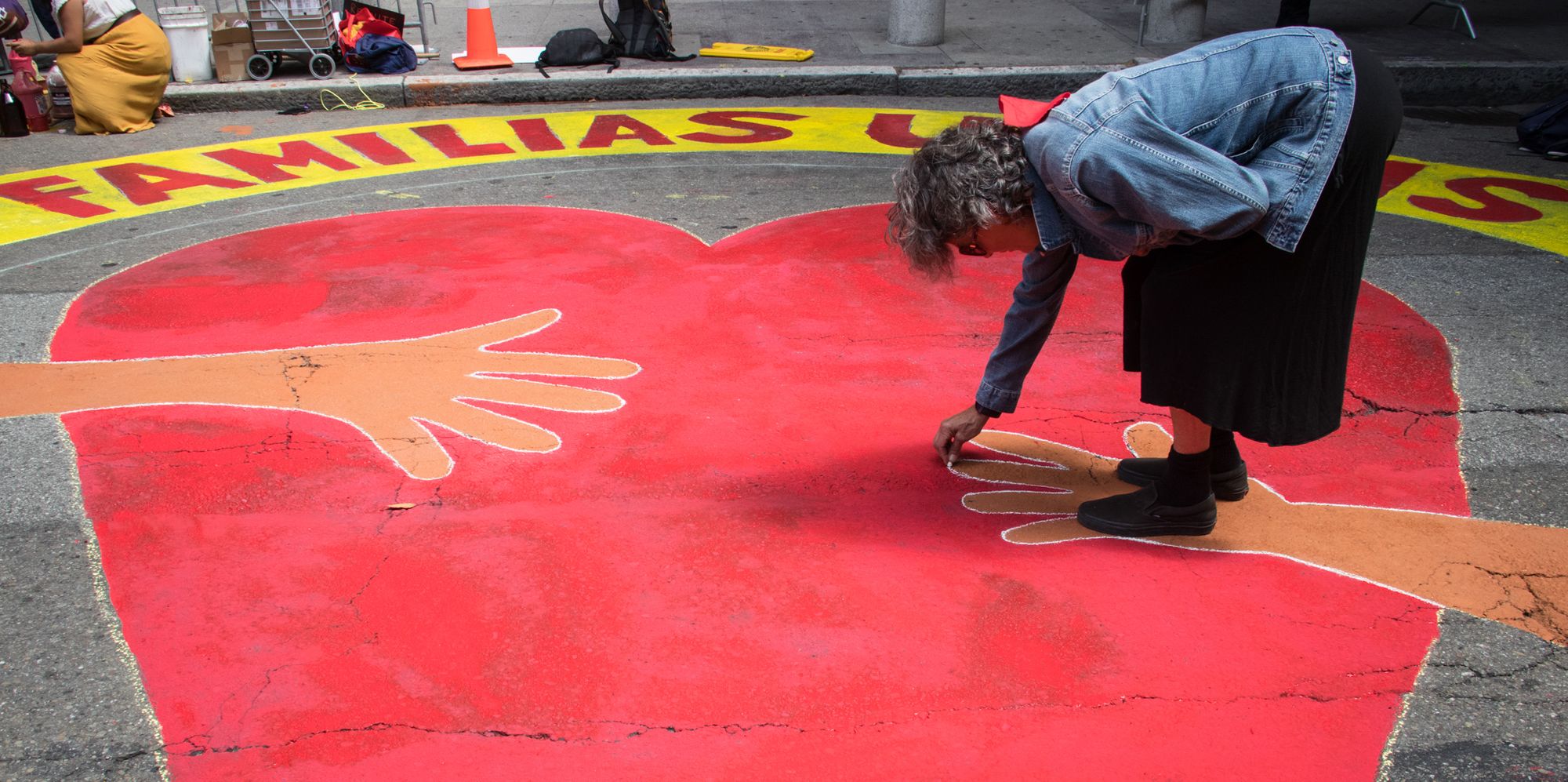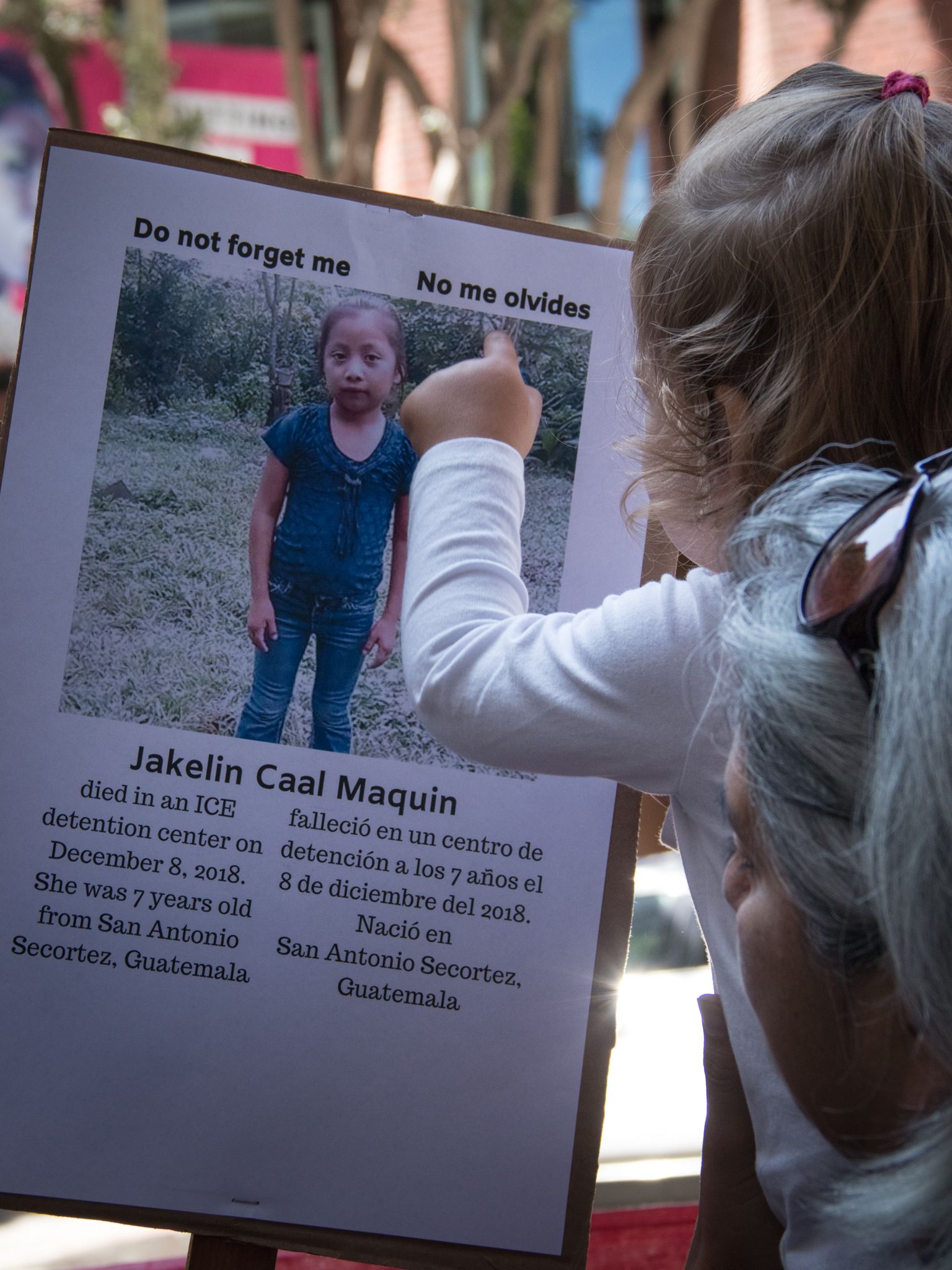by Peg Hunter
In mid-July 2019, as the US Government doubled down on caging children, family separation and cruel abuse of immigrants at our southern border, five women from the San Francisco Bay Area came up with a plan to intensify the fight to Close the Camps and to build broad and sustained resistance. Kate Raphael, Penny Rosenwasser, Judy Graboyes, Lisa Geduldig and Larisa Casillas put out a wide call for groups to rally in front of SF ICE (Immigration and Customs Enforcement) every single day in August 2019. They received an immediate, overwhelming response from groups representing a broad spectrum of the American experience… teachers, adoptees, queers, librarians, Jewish communities, indigenous communities, health workers, poets. The list goes on and on.
Each group approached the issue to Close the Camps from their own unique perspective. Some, like the Jewish and Japanese American communities, pulled from historical multi-generational trauma, while others, like adoptees and the fat and disability communities, pulled from personal, currently experienced trauma. Still others brought solidarity and active support from a wide range of unique vantage points. The daily actions not only kept attention on cruel and horrifying abuse by the US Government, they were a profound demonstration of a commitment to stand up for each other and a celebration of the ties that unite us.
Today, as we’ve passed the 1-year anniversary of the noontime rallies, the world is a different place, but cruelty remains a prominent feature of US immigration policy. The most notable difference today is that, under the guise of the COVID-19 public health emergency, the Trump administration has successfully pursued immigration policies it had only dreamt of prior to the pandemic. The administration’s new policies are restrictive and punitive on a whole new level. The very nature of the pandemic has also created a smokescreen, making accountability and visibility into government actions and their consequences extremely difficult.

Citing COVID-19 in mid March this year, the US government jumped on the new opportunity by suspending almost all laws meant to safeguard the treatment of immigrants, quickly expelling all immigrants approaching our southern borders, with no access to due process or the ability to pursue the legal right to seek asylum. This is a policy that Stephen Miller, Trump’s hardline immigration policy advisor and architect of family separation policies, had been actively looking at for years, but had previously been unable to pursue. Under this policy of expulsion, non-minors are sent to the closest port of entry, with no ability to seek asylum or legal council. Unaccompanied minors have been routed through hotels functioning as “black sites." Within days or weeks after their arrival, they are flown back to the home countries from which they fled. This is done with no paper trail and no option for legal council. Parents trying to find their children can search for weeks to determine whether they are in the US, their home country or whether they are indeed alive.
Immigrant families who were already being detained in family detention centers prior to COVID have been given a cruel option due to high rates of infection within these facilities: they can accept the release of their children with the very real potential for family separation, or they can opt to remain together in detention and face the high risk of COVID-19 infection. ICE has the power to release parents and families together, but has refused to do so.

Meanwhile, regardless of the high rates of COVID-19 positive cases within ICE detention facilities, deportation flights continue and hundreds of COVID-19 positive deportees have landed in countries with desperately inadequate healthcare systems, endangering entire regions. While those being deported are now tested for the virus after outcries from humanitarian organizations, the testing is inadequate and has not stopped the exporting of the disease. Countries refusing to accept the flights face retaliation.
Many immigrants who, pre-COVID, had been routed to Mexican border towns to pursue their legal right to seek asylum under the “Remain in Mexico” program, have watched while the US first slowed the asylum process to a trickle with “metering," and then, with the onset of COVID-19 have all but stopped the legal flow. Those waiting along the Northern Mexico border are in a state of limbo, living in extreme danger and constant fear of violence, rape and kidnapping, as they are easy prey for cartels.
While many of the specifics regarding the US government’s treatment of immigrants have evolved in the past year, especially since the onset of COVID-19, the US goal appears consistent: to prevent all immigrants, all refugees, all asylum seekers arriving from south of the border from entering the country. Toward that end, cruelty is not an unintended consequence, it is a strategic deterrent. Cruelty is the policy.
The noontime Close the Camp rallies stood in stark contrast to a US policy of cruelty, as they brought together empathy, compassion and rage from a wide range of communities from all over the Bay Area, showing up outside of ICE day after day after day. They not only brought attention to the cruelty, but they highlighted many unique ways to stand up against it. They celebrated the many ways our individual struggles are connected and our power when we make the decision to stand together.
----
Peg Hunter is a photographer and videographer whose work focuses on social justice, immigration and the environment. She has documented pieces of the immigration story in Honduras, along migrant trails in the Arizona desert, and at rallies along the border and in the SF Bay Area. In August 2019, she documented every daily noontime Close the Camps rally outside ICE in San Francisco. Her photography has been published in Yes! Magazine, Common Dreams, SF Examiner, East Bay Express, Grist, Truthout and more.

